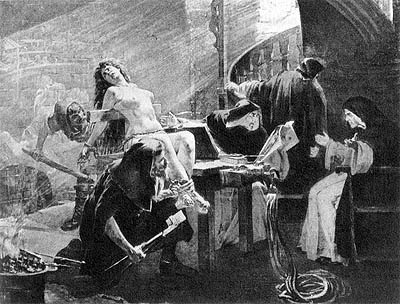Instead, Laura adheres to "Pure Principles" which Christian conservatives consider not only salvific but The Only path to salvation.
Conservatives look straight at the sun and are blinded by the light. They are seduced by beliefs too true to be good.
In the late '60s when we were at the University of Toronto, I read a zoological study done in a Michigan wilderness area. The research examined the sudden disappearance of wolves from an island ecosystem. As soon as the wolves were gone, the deer population soared. Within three generations, their surging numbers surpassed the land's "carrying capacity." Then, unexpectedly, the population not only fell but plummeted by two thirds.
Since contemporary "conservatives" have difficulty conceiving human beings as co-creators of The Incarnation, Laura avoids discussion of biological necessity and therelationship between necessity and human stewardship. (A parenthetical prediction: Pope Francis will address environmental degradation and its anthropogenic causes. Consistent with his namesake, Francis will remind humankind of its indispensable responsibilities to Earth, both personal and political. While mentioning Francis, it also bears mention that Pope Benedict used the phrase "co-creator" to describe the proper role of human beings. See "Pope Francis: Truth Is A Relationship, Not An Abstract Absolute" http://paxonbothhouses.blogspot.com/2013/09/pope-francis-truth-is-relationship-not.html) Were he alive today, Gilbert Keith Chesterton would describe conservatives' aggressive ignorance concerning collective, political responsibility as being "plain as potatoes." GKC's intellectual rigor would also persuade him that humankind is either at, or near, Earth's carrying capacity. (Chesterton and his wife - who were happily married - had no children.") http://alanarchibald.homestead.com/ChestertonQuotes.html Notably (yet rarely noted) is this curious circumstance: We humans have, in fact, fulfilled a biblical command and are now in complete compliance with Yahweh's enjoinder to "multiply and fill the earth."
Two weeks ago at Chautauqua Institution, Director of Religion, Rev. Joan Brown Campbell, offered this prayer: "Dear God, we pray for peace as if it is your responsibility and not our obligation."
I agree with Laura that contraception -- to the exclusion of child bearing -- can be a significant deprivation of goodness. But we are not talking about "no children" nor the"elimination of consumers." Neither of these outcomes looms. Some distant day we may devise a "steady-state" economy, and in the distant future we might even see something like steady-state population. But for those with eyes to see, the demographic sky is not falling. http://paxonbothhouses.blogspot.com/2013/07/conservatives-scare-more-easily-than.html
Concerning demographic growth and Vatican doctrine, I note that the Church does not prohibit marriage between sterile individuals. In the absence of procreative capability,why does the isolated "unitive" function of sterile couples not corrupt their relationship if, as the church currently teaches, unitive and procreative functions must be joined? (Earlier this year, Margaret Nutting Ralph of Lexington Theological Seminary and St. Meinrad Seminary, published a remarkably even-handed and richly-documented book, "Why The Catholic Church Must Change: A Necessary Conversation." Her chapter, "Contraception," is exemplary. http://www.goodreads.com/book/show/17396717-why-the-catholic-church-must-change)The Church's insistence on celibate priests and nuns also demonstrates that not everyone need reproduce. Indeed, the Church would welcome magnitudes more nuns-and-priests to help fill their dwindled ranks.
Historical Note: "By the 4th century, marriages of nuns were condemned as "more sinful than adultery." The Church also discouraged the marriage of priests but this was not enforced until after the First General Council of the Lateran in 1123. On the other hand, by the 5th century the role of a nun was that of a religious woman who took a vow of chastity and whose duties might include serving in hospitals, giving to the poor, and praying for others..." "Religious Nuns In Medieval Europe" - http://www.clioproject.org/files/PDF/Medieval_Nuns_Lesson.pdf It deserves mention that polygamy persisted into the early Christian era and that marriage was not made a sacrament until 1184 A.D. at the Council of Verona. http://en.wikipedia.org/wiki/Marriage_(Catholic_Church)) It has even been argued - with some validity I think - that clerical celibacy has removed "Christian genes" from "the pool" and that Vatican insistence on celibacy has delayed The Coming Of The Kingdom.
Rome's fondness for celibacy dates back to the universal expectation among first century Christians that Christ would return "tomorrow... or next week" -- in any event, "really soon!!!" -- thus obviating need for the sullying sex act. See "Why Church Fathers Were So Negative About Sex" - http://paxonbothhouses.blogspot.com/2013/03/why-church-fathers-were-so-negative.html Note that the universal conviction of early Christians that parousia was "just around the corner" was the first time, but not the last, thatthe church "got it wrong.") With the passage of time, human sexuality re-asserted itself and lay people replaced their former belief in imminent parousia with a sensus fidelium eager for connubial bliss. (It is neither accidental nor coincidental that most Christian utterances of God's sacred name take place during love-making which, thanks be to God, gives ready access to near-mystical reverie. "Deus meus!")
Why do History and Science (including the scientific study of sex) have so little resonance with so many Christians?
I myself was once "humped" by a male Rottweiler, demonstrating - in unforgettable fashion - that homosexuality also plays out between species.
Similarly, conservative Christians disdain the findings of modern psychology.
Admittedly, there is much nonsense in this "discipline," but certain phenomena -- "projection psychology" and "the psychological shadow" -- are not only well-documented and readily observable, but foundational to human experience and human history.
Although most of us ignore "the shadow" and its "projection," interpersonal and political relationships are routinely ravaged by these interactive "reflexes."
Laura's disparagement of Lauren Sandler illustrates this "point." (I wonder... Has Laura ever hosted a discussion of the contraceptive behaviors of her audience? Or would such openness run the risk of revealing discrepancy between "the ideal" and "the real?")
The glibbest way to justify self-righteousness is to spotlight other people's "shadows" and, in the process, avoid one's own.
Since "The Shadow" is always present, it can always be found.
Typically, relationships fall apart when self-righteous people focus exclusively on the shadow of others.
When spousal relationships fail, it is almost always due to the denial of one's personal shadow and disproportionate displacement of that shadow onto one's mate.
The insidious projection of one's own "shadow" onto "evil others" arises from the intractable fact that The Shadow REALLY exists.
Since human nature is compounded of good and evil, anyone can identify the existence of actual, factual evil in anyone else... in any society... in any human institution.
Just consider the evil embedded in Barack HUSSEIN Obama.
When we focus exclusively on "the other's" shadow, not only can "the other" be "damned," but damnation can be proven with real justification!
Against this backdrop, it is a great boon that Yeshua's teaching focuses disproportionately on recognition and re-appropriation of one's personal shadow. The Nazarene is pellucidly clear that humankind's underlying spiritual disease is homo sapiens' ferocious determination to "see the speck in another's eye when there is an entire tree trunk in our own."
In this regard, Yeshua's "Woe Passages" may be the most memorable teaching - but most infrequently sermonized - in his entire ministry.
One can, of course, read any widely-revered translation of Matthew's "Woe Passages."
Matthew 23
Religious Fashion Shows
23 1-3 Now Jesus turned to address his disciples, along with the crowd that had gathered with them. “The religion scholars and Pharisees are competent teachers in God’s Law. You won’t go wrong in following their teachings on Moses. But be careful about following them. They talk a good line, but they don’t live it. They don’t take it into their hearts and live it out in their behavior. It’s all spit-and-polish veneer.
4-7 “Instead of giving you God’s Law as food and drink by which you can banquet on God, they package it in bundles of rules, loading you down like pack animals. They seem to take pleasure in watching you stagger under these loads, and wouldn’t think of lifting a finger to help. Their lives are perpetual fashion shows, embroidered prayer shawls one day and flowery prayers the next. They love to sit at the head table at church dinners, basking in the most prominent positions, preening in the radiance of public flattery, receiving honorary degrees, and getting called ‘Doctor’ and ‘Reverend.’
8-10 “Don’t let people do that to you, put you on a pedestal like that. You all have a single Teacher, and you are all classmates. Don’t set people up as experts over your life, letting them tell you what to do. Save that authority for God; let him tell you what to do. No one else should carry the title of ‘Father’; you have only one Father, and he’s in heaven. And don’t let people maneuver you into taking charge of them. There is only one Life-Leader for you and them—Christ.
11-12 “Do you want to stand out? Then step down. Be a servant. If you puff yourself up, you’ll get the wind knocked out of you. But if you’re content to simply be yourself, your life will count for plenty.
Frauds!
13 “I’ve had it with you! You’re hopeless, you religion scholars, you Pharisees! Frauds! Your lives are roadblocks to God’s kingdom. You refuse to enter, and won’t let anyone else in either.
15 “You’re hopeless, you religion scholars and Pharisees! Frauds! You go halfway around the world to make a convert, but once you get him you make him into a replica of yourselves, double-damned.
16-22 “You’re hopeless! What arrogant stupidity! You say, ‘If someone makes a promise with his fingers crossed, that’s nothing; but if he swears with his hand on the Bible, that’s serious.’ What ignorance! Does the leather on the Bible carry more weight than the skin on your hands? And what about this piece of trivia: ‘If you shake hands on a promise, that’s nothing; but if you raise your hand that God is your witness, that’s serious’? What ridiculous hairsplitting! What difference does it make whether you shake hands or raise hands? A promise is a promise. What difference does it make if you make your promise inside or outside a house of worship? A promise is a promise. God is present, watching and holding you to account regardless.
23-24 “You’re hopeless, you religion scholars and Pharisees! Frauds! You keep meticulous account books, tithing on every nickel and dime you get, but on the meat of God’s Law, things like fairness and compassion and commitment—the absolute basics!—you carelessly take it or leave it. Careful bookkeeping is commendable, but the basics are required. Do you have any idea how silly you look, writing a life story that’s wrong from start to finish, nitpicking over commas and semicolons?
25-26 “You’re hopeless, you religion scholars and Pharisees! Frauds! You burnish the surface of your cups and bowls so they sparkle in the sun, while the insides are maggoty with your greed and gluttony. Stupid Pharisee! Scour the insides, and then the gleaming surface will mean something.
27-28 “You’re hopeless, you religion scholars and Pharisees! Frauds! You’re like manicured grave plots, grass clipped and the flowers bright, but six feet down it’s all rotting bones and worm-eaten flesh. People look at you and think you’re saints, but beneath the skin you’re total frauds.
29-32 “You’re hopeless, you religion scholars and Pharisees! Frauds! You build granite tombs for your prophets and marble monuments for your saints. And you say that if you had lived in the days of your ancestors, no blood would have been on your hands. You protest too much! You’re cut from the same cloth as those murderers, and daily add to the death count.
33-34 “Snakes! Reptilian sneaks! Do you think you can worm your way out of this? Never have to pay the piper? It’s on account of people like you that I send prophets and wise guides and scholars generation after generation—and generation after generation you treat them like dirt, greeting them with lynch mobs, hounding them with abuse.
35-36 “You can’t squirm out of this: Every drop of righteous blood ever spilled on this earth, beginning with the blood of that good man Abel right down to the blood of Zechariah, Barachiah’s son, whom you murdered at his prayers, is on your head. All this, I’m telling you, is coming down on you, on your generation.
37-39 “Jerusalem! Jerusalem! Murderer of prophets! Killer of the ones who brought you God’s news! How often I’ve ached to embrace your children, the way a hen gathers her chicks under her wings, and you wouldn’t let me. And now you’re so desolate, nothing but a ghost town. What is there left to say? Only this: I’m out of here soon. The next time you see me you’ll say, ‘Oh, God has blessed him! He’s come, bringing God’s rule!’”
Make no mistake. Pharisaism thrives in every generation and can not be isolated nor anachronized by the persistent conservative urge to project the living shadow of Pharisaism onto the distant past.
Alan
Pope Francis: "Truth Is A Relationship" Not An Abstract Absolute

![]()

![]()

![]()

![]()

![]()




























